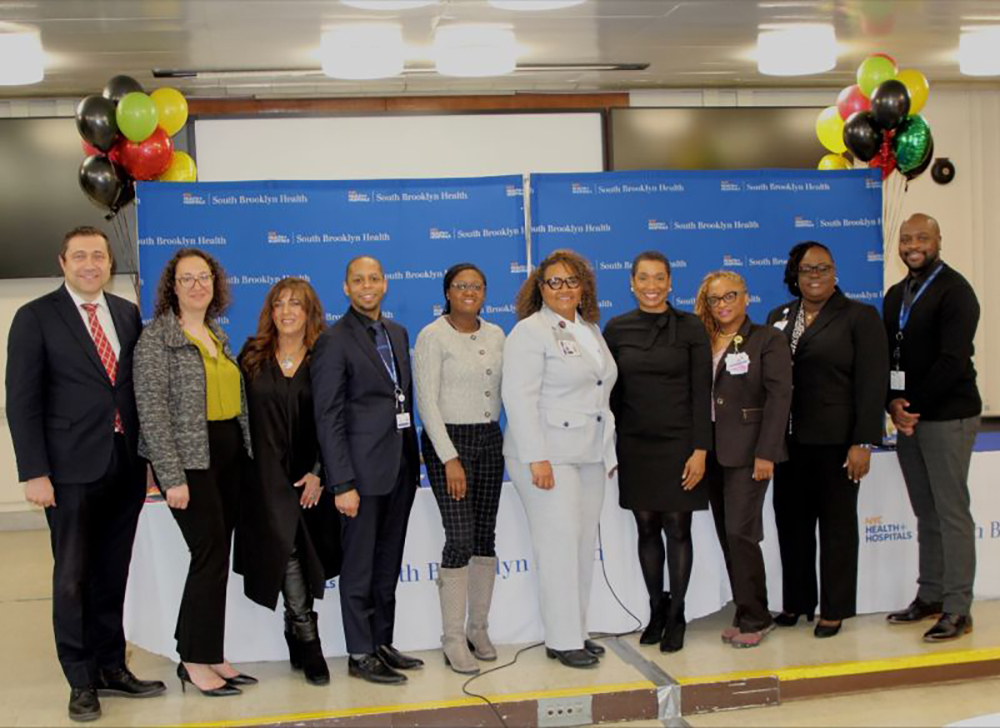|
Getting your Trinity Audio player ready...
|
By: Fern Sidman
Closing out Black History Month on Thursday morning, February 29th, South Brooklyn Health of the NYC Health + Hospitals network of premiere healthcare facilities played host to a captivating panel discussion on “Transforming the State of Health in the Black Community.”
The highly informative panel discussion was moderated by Bridgette Ingraham-Roberts, Director of Strategic Initiatives & Public Affairs of South Brooklyn Health.
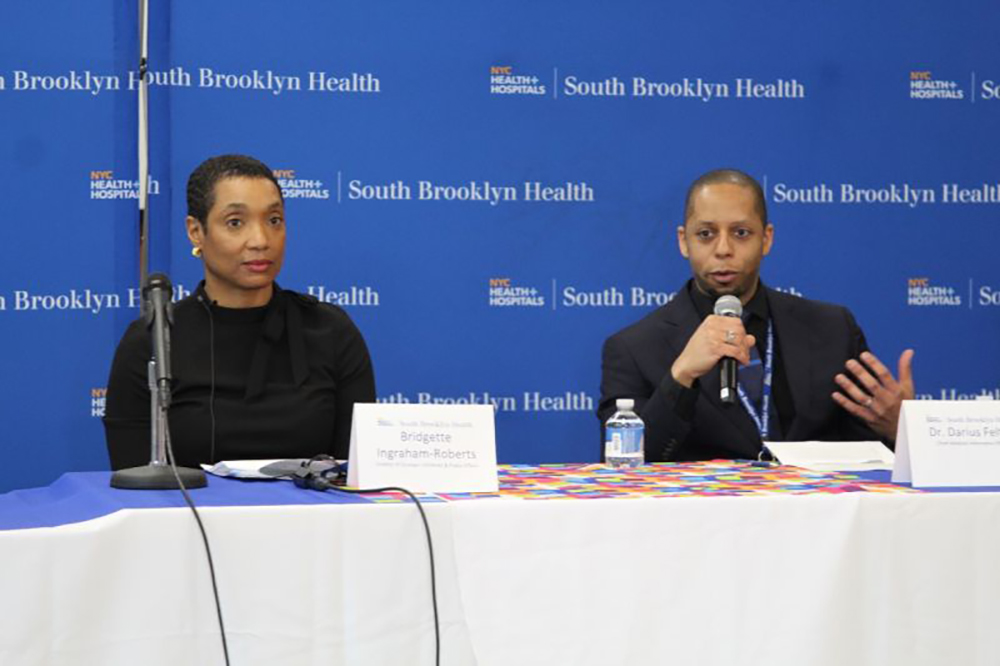
Introducing the distinguished array of seasoned health professionals was Svetlana Lipyanskaya, the CEO of South Brooklyn Health. Ms. Lipyanskaya underscored the paramount importance of delivering quality healthcare to black and brown communities and those in underserved areas. She praised the diligent efforts of the panelists to make healthcare more accessible to the black community as they negotiate glaring disparities in the healthcare industry.
Serving as moderator or the panel discussion was Bridgette Ingraham-Roberts, the Director of Strategic Initiatives and Public Affairs at South Brooklyn Health. She is a dynamic leader known for her strategic vision, advocacy prowess, and commitment to community empowerment. Her multifaceted career trajectory is characterized by a blend of corporate strategy, public relations acumen, and social responsibility, all aimed at fostering positive change and driving impactful outcomes.
Bridgette’s career trajectory took a significant turn when she joined South Brooklyn Health, a leading healthcare organization committed to serving the diverse needs of the local community. As Director of Strategic Initiatives and Public Affairs, she plays a pivotal role in shaping the organization’s strategic direction, fostering partnerships, and enhancing its public image.
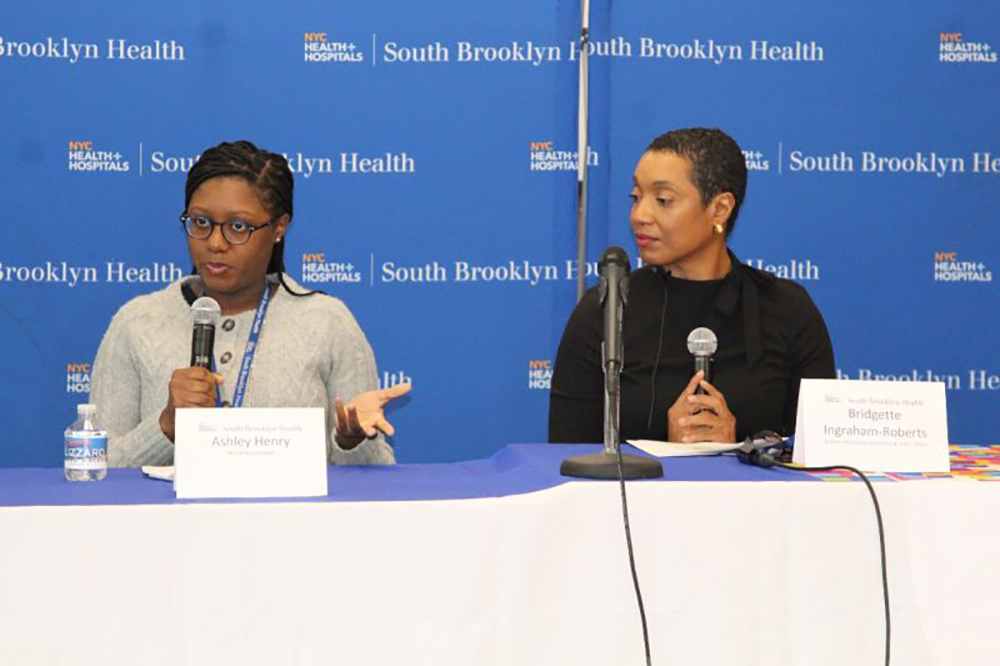
Prior to joining the team at South Brooklyn Health in December 2020, she was an Assistant Vice President for Government & Community Relations in the corporate office for NYC Health + Hospitals, where she served as the health system’s primary liaison to the Mayor’s office, the New York City Council, Borough Presidents, NYC Comptroller and Public Advocate for all legislative, regulatory and public policy initiatives that impacted the health system.
Under Bridgette’s guidance, South Brooklyn Health has launched several impactful programs aimed at improving access to healthcare services, promoting health equity, and addressing the social determinants of health. Her strategic acumen and advocacy prowess have positioned the organization as a trusted partner and leader in the healthcare landscape.
Dr. Michelle Soto, Chief of Ambulatory Care at South Brooklyn Health, is a distinguished healthcare professional known for her exceptional leadership, clinical expertise, and commitment to improving patient outcomes. Her journey to becoming a prominent figure in the healthcare industry is marked by dedication, compassion, and a relentless pursuit of excellence.
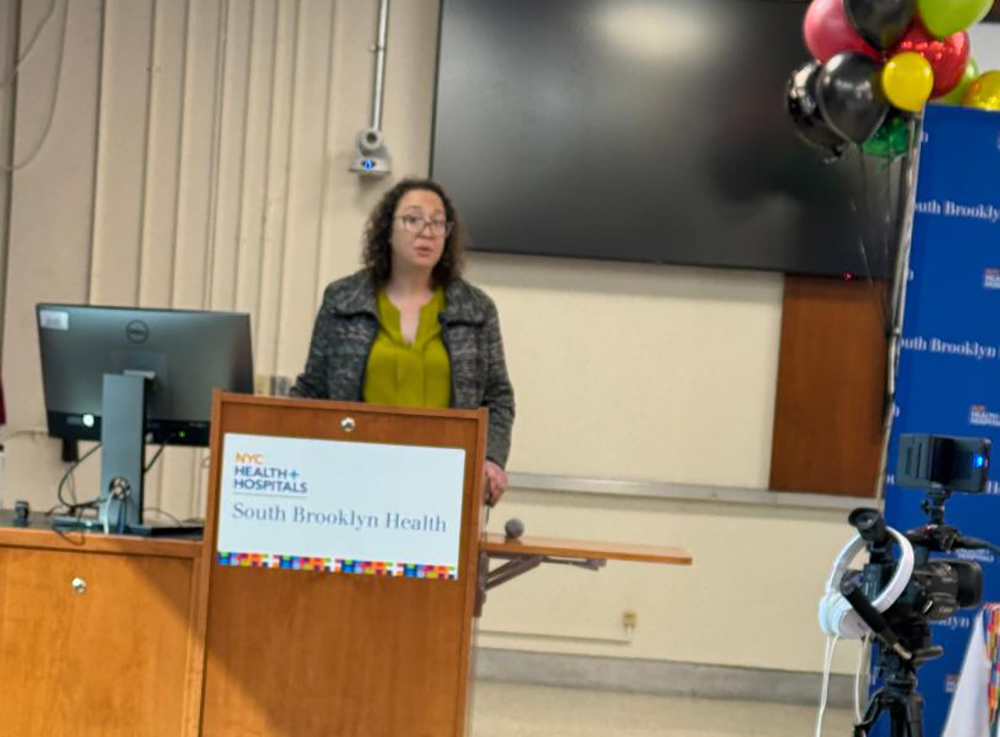
She has been at South Brooklyn Health since July 2019 when she joined as the Director of Primary Care. She was promoted to the position of Chief of Ambulatory Care in January 2021 and Health Equity Officer in 2023.
Born in Brooklyn, Dr. Soto is an Afro-Latina of Puerto Rican heritage. She oversees a comprehensive range of outpatient services aimed at promoting wellness, preventing illness, and managing chronic conditions. In her role, she leads a multidisciplinary team of healthcare professionals, fostering a culture of collaboration, excellence, and continuous improvement.
Under Dr. Soto’s leadership, South Brooklyn Health has implemented numerous initiatives to enhance access to care, optimize operational efficiency, and elevate the patient experience. Her strategic initiatives have resulted in measurable improvements in patient outcomes, satisfaction scores, and overall organizational performance.
Ashley Henry, Nurse Practitioner (NP) at South Brooklyn Health, is a compassionate and dedicated healthcare professional known for her expertise in primary care, patient advocacy, and commitment to providing high-quality healthcare services to underserved communities. Her journey to becoming a trusted healthcare provider is marked by determination, empathy, and a deep-seated passion for making a positive difference in the lives of her patients.
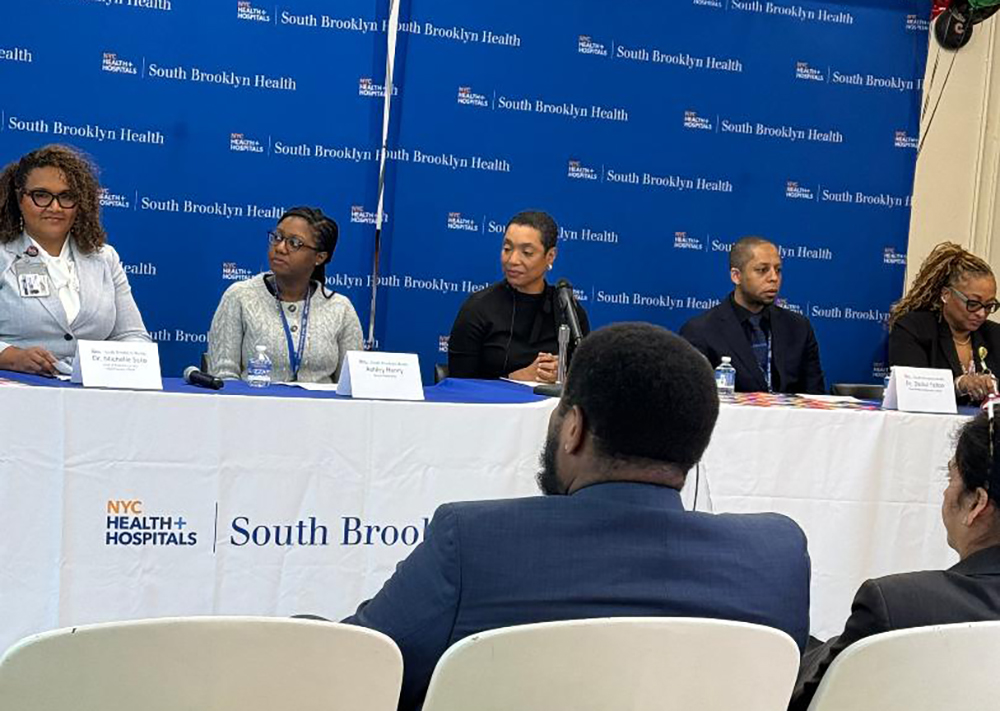
Ashley’s journey in healthcare began with a strong foundation in education and a genuine desire to help others. Raised in a close-knit community in Brooklyn, New York, she was inspired by her family’s values of compassion and service. From a young age, Ashley demonstrated a keen interest in healthcare and a natural inclination towards caring for others.
Together with community health workers, Ashley helps connect patients to resources such as food, housing and transportation throughout New York City.
She holds a Masters of Public Health in Epidemiology from the University of Washington and a Master of Science in Nursing from Yale University.
In addition to her clinical responsibilities, Ashley is a passionate advocate for healthcare equity and social justice. She actively collaborates with community organizations, participates in health education initiatives, and advocates for policies that promote access to quality healthcare for all individuals, regardless of their socioeconomic status or background.
Darius Felton, MD, is a highly esteemed physician at South Brooklyn Health, renowned for his exceptional medical expertise, dedication to patient care, and leadership in healthcare innovation. His illustrious career is marked by a steadfast commitment to improving healthcare access, advocating for health equity, and advancing medical knowledge to benefit his community.
Dr. Felton is the Chief Medical Information Officer at South Brooklyn Health and is a board certified physician in Emergency Medicine and Clinical Informatics. He leads the data and analytics core team for South Brooklyn, which has rapidly expanded their data driven decision making capabilities.
Dr. Felton is a passionate advocate for healthcare access and affordability, working tirelessly to ensure that all patients have access to quality medical care, regardless of their socioeconomic status or background. He is committed to addressing healthcare disparities and empowering communities to take charge of their health and well-being.
Althea Senior-Morris, MSN, is a highly respected Nurse Leader at South Brooklyn Health, known for her exceptional clinical expertise, dedication to patient care, and commitment to nursing excellence. Her illustrious career is distinguished by her unwavering passion for healthcare, innovative leadership, and tireless advocacy for both patients and fellow healthcare professionals.
She is currently the Associate Executive Director of Ambulatory Nursing at South Brooklyn Health. She has more than 28 years of experience working in NYC Health + Hospitals and has 18 years of progressive leadership experience. She was a 2023 Power Women of Brooklyn honoree for her influence, impact and continued commitment to the Brooklyn community.
Under Althea’s leadership, South Brooklyn Health has implemented numerous initiatives aimed at enhancing patient care, improving clinical outcomes, and promoting a culture of safety and quality within the organization. Her innovative approaches to nursing leadership have resulted in measurable improvements in patient satisfaction, nurse retention rates, and overall organizational performance.
Seun Ajibade, an exemplary healthcare leader, serves as the Director of Nursing at South Brooklyn Health, where he brings a wealth of experience, compassion, and innovation to his role. He has a distinguished 20-year career in behavorial health, showcasing a comprehensive blend of hands-on clinical experience and leadership acumen.
His strategic vision and commitment to excellence at South Brooklyn Health have been instrumental in advancing patient care standards.
Under Seun’s leadership, South Brooklyn Health has achieved significant milestones in nursing excellence, including improved patient outcomes, increased staff satisfaction, and recognition for nursing quality and innovation. Seun is a champion for evidence-based practice, implementing best practices and innovative solutions to enhance patient safety and quality of care.
Jasmin Ryan, an exemplary healthcare leader, serves as the Associate Director of Ambulatory Care at South Brooklyn Health, where she brings a wealth of experience, expertise, and compassion to her role. Jasmin’s journey in healthcare leadership is characterized by her unwavering dedication to patient-centered care and her commitment to fostering excellence in ambulatory services.
She has over 13 years of experience in healthcare, beginning her career as a clerk in the Emergency Department and rising in the ranks Assistant Director. During the Covid-19 pandemic, Jasmin remained a dynamic leader, consistently providing support to her team in the midst of uncertainty.
As Associate Director of Ambulatory Care, Jasmin plays a pivotal role in overseeing the operations of outpatient clinics, ensuring the delivery of high-quality, patient-centered care to individuals and families in the community. She collaborates closely with interdisciplinary teams to develop and implement strategic initiatives aimed at optimizing ambulatory services and improving patient outcomes.
Jasmin is known for her innovative approaches to healthcare delivery, leveraging technology, data analytics, and evidence-based practices to drive continuous improvement and innovation in ambulatory care. Under her leadership, South Brooklyn Health has achieved significant milestones in patient satisfaction, clinical outcomes, and operational efficiency.
As the panelists fielded questions that were read by Bridgette Ingraham-Roberts, Dr. Soto observed that “we should be encouraging more students to pursue careers in the sciences and in healthcare. We need qualified staff to treat black patients and we need services provided in the evenings and on weekends for those who are working. We need to make healthcare accessible while educating patients to advocate for themselves.”
She added that, “We want our providers to offer screenings for cancer and HIV. We want to encourage the black community and others to bring children in for vaccines and screenings for HIV at the age of 13.”
Pertaining to women’s health issues, Dr. Soto said at the age of 21,women should be screened for cervical cancer and at the age of 40, women should be screened for breast cancer through routine mammograms. She added that at ahe 45, both women and men should be screened for colorectal cancer through a colonoscopy. For men, the suggested age to start screening for prostate cancer would be 50.
Ashley Henry told the assemblage that African American adults are 60% more likely to develop such illnesses are diabetes heart disease and kidney failure as opposed to non-Hispanic Caucasians.
Ms. Henry noted that the black community faces formidable challenges such as lack of access to healthcare and lack of access to healthy food options. She also observed that societal maladies such as systemic racism, discrimination, crime and lack of education all play a role in contributing to the escalation of health issues in the black community.
She also elaborated on social barriers that exist in the black community that adversely affect the health and well being of the black community and said that her role in providing patients with housing, food and transportation play a critical role in improving the lives of the patients that she sees.
Dr. Darius Felton focused his remarks on the disparities in the healthcare system and how they affect the black community. In particular, Dr. Felton said that black males very often have a deep seated mistrust of the healthcare system and as a result do not seek medical help and are quite reluctant to explore healthcare options.
“The population is on edge,” said Dr. Felton. “We have a very narrow window to get it right. If black men do come in for health related matters, they might not come back,” he added.
He also said that black men have a higher rate of prostate cancer than white men. “If we can catch prostate cancer early in black men, it can be prevented so we have to publicize that fact,” Dr. Felton added.
Dr. Felton also addressed the sometimes thorny issue of healthcare equity and said that race has always been used as a way of differentiating patients. “We need to focus on individualized care, rather than care predicated on race. He added that for the black community, in order to gain trust in the doctor-patient relationship, patients want to see that their healthcare providers look like themselves.
He also strongly advised clinicians to “help your patients get connected to healthcare” and by offering them easy access to their medical data, they will feel like they are in charge of their healthcare.
Althea Senior-Morris addressed the issues pertaining to problems in pregnancy among black women and spoke of adding doulas to the obstetrics team. She also said physicians must encourage women to undergo routine gynecological check ups and to instruct women to do monthly self-breast examinations.
“Learning how to communicate with patients should be a chief priority for doctors, “ said Ms. Senior-Morris. “We must establish a trusting relationship with patients and in order to do that, we really need to be non-judgmental. We must try to identify in race related symptoms, “ she added.
Seun Ajibade cogently addressed the issue of mental health in the black community. He said that black people living under the poverty line often face emotional distress. He added that they are less likely to seek out mental health services and are more likely to suffer from depression. He explained that in the black community, “there is an over reliance of self resilience. Getting help seems that somehow they believe they are weak.”
“We need providers that look like us and we must work with patients on helping them to get the right insurance because without it it prevents people from obtaining the services that they need, “ he added.



